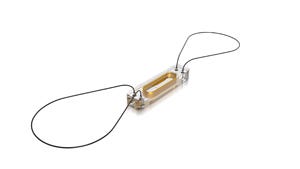How Much Do Hospitals Pay To Buy CardioMEMS's Heart Failure Device?
How much are hospitals paying to buy this clinically novel technology for heart failure patients?
October 17, 2014

Back in May, St. Jude Medical exercised its option to buy Atlanta-based startup, CardioMEMS, the moment the latter's product won FDA approval.
|
The CardioMEMS wireless implantable sensor |
The CardioMEMS HF system is the world’s first implantable wireless pulmonary artery pressure sensing device for heart failure patients. The approval makes the core technology - pulmonary artery pressure measurement - which is very well known and regarded in clinical circles - available to monitor congestive heart failure patients at home, which many consider a clinical breakthrough.
In a conference call with analysts on Thursday, St. Jude Medical revealed what the average selling price of this technology is.
A cool $24,950.
A Medtronic executive in the past has raised the notion that having an implantable system is perhaps a much too expensive answer to managing congestive heart failure patients.
However, St. Jude seems to have convinced the Centers For Medicare and Medicaid.
In the conference call, Daniel Starks, CEO of St. Jude Medical, highlighted the fact that CMS will reimburse the device.
"Our most important accomplishment with respect to market development during the third quarter is that we received from CMS -- we received approval from CMS for a New Technology Add-On Payment or NTAP that took effect October 1, 2014. The NTAP is an affirmation from CMS that CardioMEMS represents a substantial clinical improvement in the treatment of Class III heart failure patients."
Private payors typically follow the lead of CMS when it comes to reimbursing new technologies and it will be interesting to see whether the pattern will continue.
At AdvaMed's annual conference held in Chicago earlier this month, the lobby group released a report showing that insurers are so focused on cost that they are reluctant to approve clinically appropriate but costly technologies.
The tough reimbursement enviroment later led a Cigna executive to counter that while cost is an important factor, what's more important is clinical value.
And CardioMEMS has demonstrated value.
In a clinical trial with 550 patients, the CardioMEMS device implanted on the pulmonary artery showed a 28% reduction in the heart failure hospitalizations at six months, and a similar 37% reduction during an average, 15-month follow-up period.
The device may end up being an exception in how insurers are scrutinizing new technologies.
-- By Arundhati Parmar, Senior Editor, MD+DI
[email protected]
You May Also Like



